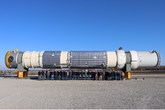Expansion of the Hattorf potash site approved
Published by Robyn Wainwright,
Assistant Editor
World Fertilizer,
The regional council in Kassel has approved the expansion of the Hattorf (Philippsthal) tailings pile. With this, the disposal of solid production residues which is an important requirement for producing potash at this site, has been ensured.
“The granted permit now provides the employees of the site, but also the entire company, a good deal of future security,” said K+S CEO Dr. Burkhard Lohr. “After seven years of intensive work, it brings us one step closer to our goal of being able to use our full capacity for processing crude salt without restrictions caused by disposal bottlenecks. I am confident that we are on the right track regarding our wastewater disposal issues.”
The granted permit covers an area of approximately 27 ha., which is an expansion of the northwestern part of the existing pile. It provides enough space for five to six years. In addition, the official review of the application for the second phase of the pile extension, which would provide enough space until the early 2040s, is already in progress.
Filling can be started soon because the preparation of the expansion area had already begun with an early approval at the beginning of 2018. This had made it possible, within the scope of the pile concept, to get the extensive preparatory work done, which included sealing the base and installing a conveyor belt system. This preparatory work now allows for a continuous production without interruption.
At first, filling will proceed separately from the old tailings pile. The connection between the old and the new pile will be done gradually. Similar to the existing pile, the new one will reach a height of 180 m.
Read the article online at: https://www.worldfertilizer.com/project-news/11102018/expansion-of-the-hattorf-potash-site-approved/
You might also like
Beatrice fertilizer plant receives massive new ammonia converter
The Koch Fertilizer plant in Beatrice, Nebraska, US, has acquired a large ammonia converter measuring 98 ft long and 14 ft wide.

